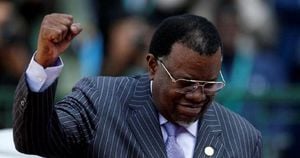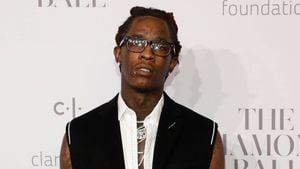Donald Trump has named Lebanese-American businessman Massad Boulos as his senior advisor for Arab and Middle Eastern affairs, sparking conversations about family ties, political alliances, and the complex dynamics of U.S. foreign policy. This announcement was made on Sunday via Trump’s social media platform, Truth Social. The choice aligns with Trump’s pattern of appointing family affiliates—Boulos is the father-in-law of Trump’s daughter Tiffany—as key positions within his administration.
During his announcement, Trump praised Boulos, calling him “an accomplished lawyer and a highly respected leader in the business world” with significant experience on the international stage. He emphasized Boulos’s role as an asset to his campaign, particularly highlighting his contributions to building coalitions within the Arab American community. The president-elect noted, "He has been a longtime proponent of Republican and Conservative values and is known as a dealmaker."
Boulos’s appointment assumes added significance against the backdrop of the volatile political situation within the Middle East, particularly as the region grapples with the continuing Israel-Gaza conflict, which has seen escalated violence and rising civilian casualties.
His involvement with the Trump campaign was pivotal as he worked to mobilize Arab Americans and Muslim voters, many of whom expressed dissatisfaction with President Joe Biden’s policies concerning Israel. Boulos used his platform to advocate for Trump, assuring voters of the ex-president’s commitment to fostering peace within the region.
A noteworthy moment during Boulos’s campaign activism came when he stated, "Those massacres would not have happened if there was a strong president at the White House,” directly referencing the humanitarian crisis arising from the Israel-Hamas conflict. Boulos’s statements reflect the frustrations felt by many voters who yearned for greater governmental support and action in favor of Palestinian rights.
Boulos also arrives at his new position with extensive knowledge of Lebanese politics. Born and raised in Lebanon, he relocated to Texas during his teenage years, where he later earned his law degree at the University of Houston. Boulos has established connections within Lebanon’s political system, reportedly maintaining relationships with various factions, from the Christian Lebanese Forces Party to Suleiman Frangieh, who is aligned with Hezbollah. His ability to bridge these often-divergent political groups may prove advantageous as he navigates complex issues affecting the region.
Despite his Lebanese roots, Boulos has emerged as a prominent figure representing American interests. He has previously played the role of intermediary between Trump and Palestinian leaders, including Mahmoud Abbas, signaling his willingness to engage with diverse and sometimes contentious groups to advocate for peace. His background and extensive network present unique opportunities for diplomatic engagement as he steps forward to assume his advisory role.
Alongside this strategy, Boulos will help steer U.S. policy toward realizing Trump’s objective of extending the Abraham Accords, agreements aimed at normalizing relations between Israel and Arab nations. The successful expansion of these accords has been both anticipated and critiqued, as the geopolitical atmosphere within the Middle East remains tense, particularly with the renewed Syrian Civil War and the struggles faced by Lebanon from regional conflicts.
With the fragile ceasefire between Israel and Hezbollah already facing violations, and the civil strife intensifying across Syria, Boulos’s role becomes even more challenging, requiring deft negotiation skills and political acumen. Observers and analysts point out the potential pitfalls associated with Boulos executing Trump’s vision amid existing hostilities and civil unrest.
Massad Boulos now enters this multifaceted arena as Trump endorses his potential to lead with authority and persuasion, aiming to navigate America’s foreign policy with respect to the Arab and Middle Eastern populace. His appointment serves as another reminder of how personal relationships and political objectives intertwine within the current administration.
The American public—and particularly the Arab American community—will be watching closely as Boulos steps forward to articulate and implement policies meant to address longstanding issues of peace, security, and the future of relations not only between the United States and Arab nations but also among various factions within Lebanon and beyond.
Overall, this appointment reflects both the challenges and the strategic possibilities of having someone like Massad Boulos—a Lebanese-American businessman with deep personal and professional ties to the region—in such a pivotal role. While Trump leans on personal connections to bolster his approach to foreign affairs, Boulos’s capacity to innovate diplomatic strategies will be tested, shaping the course of U.S. interactions within the ever-evolving Middle Eastern political theater.



